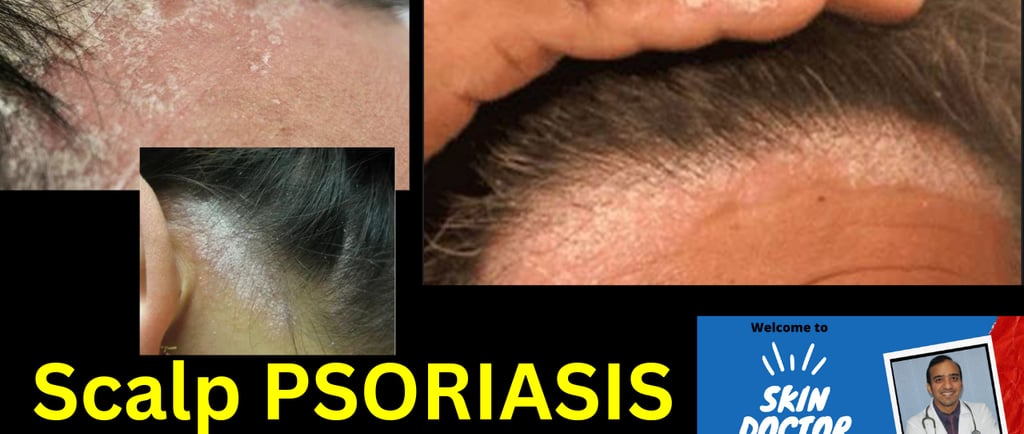Scalp psoriasis
Understanding scalp psoriasis
Dr.Sujith karimbil
8/13/20232 دقيقة قراءة
Scalp Psoriasis : watch Video click here:https://youtu.be/VR08aCUrLiw


Title: Scalp Psoriasis: Causes, Symptoms, and Effective Management
Introduction: Scalp psoriasis is a common skin condition that affects the scalp, causing discomfort and often leading to embarrassment due to its visible nature. Understanding this condition is key to effectively managing it. In this blog post, we'll explore the causes, symptoms, and actionable strategies for managing scalp psoriasis, ensuring healthier hair and skin.
Keywords:
Scalp psoriasis
Psoriasis on scalp
Scalp psoriasis causes
Scalp psoriasis symptoms
Scalp psoriasis management
Treatment for scalp psoriasis
Scalp psoriasis remedies
Best shampoos for scalp psoriasis
Natural remedies for scalp psoriasis
Psoriasis hair care tips
Causes and Symptoms of Scalp Psoriasis: Scalp psoriasis is linked to an overactive immune system, causing skin cells to multiply too quickly. This results in the accumulation of thick, silvery scales and red patches on the scalp. Common symptoms include:
Itching and discomfort
Flaking skin resembling dandruff
Redness and inflammation
Soreness or burning sensation
Effective Management Strategies:
Gentle Cleansing: Use mild, fragrance-free shampoos and avoid harsh products that may worsen symptoms. Opt for hypoallergenic and sulfate-free options.
Medicated Shampoos: Look for shampoos containing coal tar, salicylic acid, or ketoconazole, which can help reduce scaling and inflammation.
Topical Treatments: Prescription corticosteroid lotions or creams can help manage inflammation. Apply them directly to the affected areas.
Vitamin D Analogues: These topical treatments can slow down skin cell growth and reduce scaling.
Avoid Scratching: Scratching can worsen symptoms and lead to infection. Trim your nails and consider wearing a cap to prevent direct scratching.
Natural Remedies: Aloe vera, coconut oil, and apple cider vinegar can provide relief when applied to the scalp, but consult a dermatologist first.
Phototherapy: Controlled exposure to UVB light can slow down skin cell growth and reduce inflammation.
Stress Management: Stress can trigger flare-ups. Engage in relaxation techniques such as yoga, meditation, or deep breathing.
Hair Care Tips:
Gently comb and brush your hair to avoid disturbing the scales.
Avoid tight hairstyles that may cause irritation.
Choose hair products without harsh chemicals or fragrances.
Lifestyle Changes:
Maintain a balanced diet rich in nutrients, including omega-3 fatty acids and antioxidants.
Stay hydrated and avoid excessive alcohol and caffeine consumption.
Regular exercise can improve overall well-being and potentially help manage symptoms.
Consult a Dermatologist: If scalp psoriasis persists or worsens, consult a dermatologist for personalized advice and treatment options tailored to your specific condition.
Conclusion: Scalp psoriasis can be managed effectively with the right strategies and products. By understanding its causes, recognizing symptoms, and implementing appropriate treatments, you can alleviate discomfort and achieve healthier hair and scalp. Incorporate these tips into your routine and consider seeking professional guidance to ensure the best possible outcome for managing scalp psoriasis
